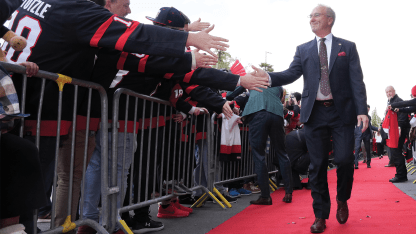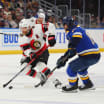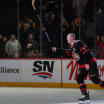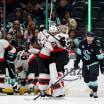“I think it's going pretty well,” said Poulin, on the one-year anniversary of his hiring. In Dallas, where the Senators were winding down the final hours of 2024, the veteran hockey executive was reflecting aloud on how far he – and the entire organization – have come in the past 12 months.
“If you broke it into two sections, from January to June, we were learning about what we had in the organization. And not just on the ice. Off the ice as well,” says Poulin. “We looked at different processes. How things were being done. You want to put your stamp on that when you come to an organization.”
In the second half of 2024, management's work continued in the context of a new NHL season. And the Senators completed the year on a high note, collecting 19 of a possible 26 points in December – posting the best record of any Eastern Conference team in the month.
“From that standpoint, I think we feel that we have accomplished some of that but it’s always going to be a process,” says Poulin. “You’re always looking for better ways to do things. You’re looking for more efficient ways to do things. And you are looking to put people in the right places to do those things. We have to put the pieces that we have in the right places.”
Through it all, the Senators' stability is slowly settling in, one day at a time.
“Jacques Martin was in before I arrived. That was the first step towards stability. Then it moved on to Travis Green and his staff. That’s a big factor in what we have done early, hiring Travis and letting him put his staff in place.”
Teamwork
In the mid-1980s, when he was captain of the Philadelphia Flyers, Poulin didn't fraternize exclusively with hockey players. One of the best baseball players of the era, Phillies star third baseman Mike Schmidt, was a training partner.
Schmidt, who won 10 Gold Gloves and three National League MVP awards, sometimes envied hockey players who had the chance to play a true, complete team sport.
“Mike worked out with us during his season. He was in the gym at 7 a.m. with our group. He won the MVP I believe at the age of 36 changing his conditioning routine,” says Poulin. “But he would say to me that we were so lucky in our sport. Even in games where you don’t score any point but you killed four penalties, you play great. You win 2-0 and you are the third star. He always had to hit. He had to hit home runs. He felt like we played in the ultimate team sport where you can be a very valuable player without hitting home runs.”
Poulin doesn't necessarily use this anecdote too often in his interactions with current hockey players, but the story has never left him. Some 40 years later, he remains convinced that teamwork is one of the most important elements of a hockey team's success. Once again, it's not limited to what happens on the ice.
At the December 31, 2023 press conference, Poulin also explained that he and Staios complement each other, without necessarily mirroring each other.
Lively discussions, debates and differences of opinion are part of both men's daily lives.
“When you assemble a group, just like when you assemble a team, if you have all like parts, it’s not going to work,” says Poulin. “From that standpoint, when you are putting a staff together, you have to understand that there is going to be some disagreements. There’s going to be uncomfortable times. It has to be that way. You can’t all agree on everything. It doesn’t work like that in our business. It doesn’t work like that in any business.”
Poulin and Staios both left their mark on NHL rinks, but their careers took place at different times. Poulin was a centre. Staios played defense. When he decided to hang up his skates, Staios immediately turned to management. Poulin was head coach of the Fighting Irish at the University of Notre Dame for a decade. He also completed a very formative ten-year passage in the media world.
“I think we understood that we had different backgrounds and that we are different people,” says Poulin. “We approach problems in different ways but we arrive at a lot of the same conclusions. We just get there in different ways. That can be very healthy. I learned a lot from Steve in my first year. It’s just about the way he looks at things. He’s incredibly analytic. He’s a very good problem solver.”
For Ottawa
The second year for Poulin and Staios has gotten off to an encouraging start.
“We're staying the course,” says Poulin. Hockey operations management continue to preach patience to the players, while looking for ways to accelerate the team's progress.
Dave Poulin understands the fans' appetite. Even though he's only been officially part of the Senators organization for 12 months, he feels he knows the Ottawa-Gatineau market very well.
“I had the advantage of working in this market, but on the other side,” says Poulin, about his time in the media.
“I have seen it two different ways. First, I was an incoming broadcaster with TSN who worked on Senators games. But probably the most revealing was the last three years when I worked on the morning radio show, three days a week That attachment to the city was different for me. What has been magnified is the passion of the fans. The passion, the attachment to the Ottawa Senators.”
Poulin was quick to see the difference between Ottawa and other markets where hockey fuels passion. As a player, he's mostly played in two cities - Boston and Philadelphia - where the fans have been devoted for a very long time.
“The way that I always described Boston is they had three different generations of fans who hated the Montreal Canadiens. The grandfather did, the father did and now the son does. It’s newer in Ottawa. It’s no less passionate,” says Poulin.
The passion is just displayed differently.
“In some ways, because it started in the early 90’s, its theirs. For lots of those people, it’s theirs. They were at the first game. It’s not something that was handed to them. It’s their ownership. It didn’t move from somewhere else. It’s the Ottawa Senators. They own it.”



















